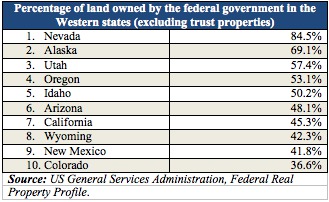It’s time to free the West
As the GOP presidential contest moves on to the Western states, beginning with Nevada's Feb. 4 caucuses, presidential candidates need to weigh in on what is perhaps the most pressing federal issue confronting the West: Who should control Western lands?
In 1979, Nevada lawmakers fired a salvo re-opening the long-running struggle by Western states to reclaim from federal authorities control of the land within state boundaries — the movement popularly known as the "Sagebrush Rebellion." That year, Nevada lawmakers asserted that federal ownership of 86 percent of the land within the state's borders comprised an unconstitutional burden that "works a severe, continuous and debilitating hardship upon the people of the State of Nevada."
Federal ownership of most of the lands within Nevada's borders finds its origin in the state's 1864 enabling act. While Congress declared at the outset of that act that Nevada "shall be admitted into the Union upon an equal footing with the original states, in all respects whatsoever," it then placed several conditions on Nevada's statehood to which the original states were never subject. Chief among these conditions was the requirement that Nevadans "forever disclaim all right and title to the unappropriated public lands lying within [the state's borders], and that the same shall be and remain at the sole and entire disposition of the United States."
When lawmakers passed the 1979 legislation rebuking the federal government for its stranglehold on Silver State lands, they proclaimed this condition of statehood unconstitutional, citing a U.S. Supreme Court case in which a nearly identical provision within Alabama's enabling act had been declared unconstitutional. In Pollard v. Hagan (1845), the high court decided that "the United States never held any municipal sovereignty, jurisdiction, or right of soil in and to the territory of which Alabama or any of the new states were formed; except for temporary purposes." As soon as new states were formed, said the Court, "the power of the United States over these lands as property was to cease."
Indeed, for a short time after this decision, Congress abode by the words of the Court. When, later that year, Congress admitted Texas to the Union, it allowed that state to retain ownership over all unappropriated lands within its jurisdiction. Congress, said Nevada lawmakers in 1979, was acknowledging a precedent that "inured to the benefit of all states admitted later ‘on an equal footing.'"
Concluded Nevada lawmakers: "The attempted imposition upon the State of Nevada by the Congress of the United States of a requirement in the enabling act that Nevada ‘disclaim all right and title to the unappropriated public lands lying within said territory,' as a condition precedent to acceptance of Nevada into the Union, was an act beyond the power of the Congress of the United States and is thus void."
In the years since Nevada enacted its statutory rebuke of federal control over lands within the state's borders, the Sagebrush Rebellion has continued to gain momentum. In 2011, lawmakers in neighboring Utah fired the latest shot with passage of HJR 39 — a joint legislative resolution that garnered 56 cosponsors. It relied upon many of the legal arguments first raised by Nevada lawmakers three decades ago, and called on Congress to relinquish control of "all right, title, and jurisdiction in those lands that were committed to the purposes of the state [of Utah] by terms of its enabling act compact."
Indeed, the relevance of this issue extends far beyond the borders of Nevada and Utah — federal land control is an obstacle to all the Western states. At a time when most Western states face substantial fiscal challenges and job losses, transfer of federal lands to state control could well lead to an immediate reversal of fortune for Western states. Public auctioning of these lands could yield billions of dollars in immediate state revenues, while private-sector development of these lands would stimulate job growth and wealth creation.
 The unequal treatment that Congress has meted out to the Western states — denying them their constitutional equal footing and hoarding huge swaths of land within their borders — remains an open wound in the American West.
The unequal treatment that Congress has meted out to the Western states — denying them their constitutional equal footing and hoarding huge swaths of land within their borders — remains an open wound in the American West.
It is long past time for Congress to respond and rectify the situation.
No presidential or congressional candidates should campaign in the Western states without making clear where they stand on this critical question.
Geoffrey Lawrence is deputy policy director at the Nevada Policy Research Institute. For more visit http://npri.org.